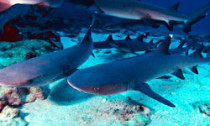
A new study by the Australian Institute of Marine Science (AIMS) has found that healthy shark populations may be a key to the recovery of endangered coral reefs. Monitoring of reefs off Australia’s north-west coast shows that where shark numbers were lower due to fishing, herbivores important fishes in promoting reef health -were also significantly lower in numbers. AIMS Principle Researcher and co-author of the study, Mark Meekan said that at first glance the result might seem strange.
“However, our analysis suggests that where shark numbers are reduced we see a fundamental change in the structure of food chains on reefs. We see increasing numbers of mid-level predators – such as snappers – and a reduction in the numbers of herbivores, such as parrotfishes”, Dr Meekan said.
“The parrotfishes are very important because they eat the algae that would otherwise overwhelm young corals on reefs recovering from natural disturbances.”
The study comes at an opportune time in the life of coral reefs, which are facing a number of pressures both from direct human activity, such as over-fishing, and from climate change.
Lead author of the report, Jonathan Ruppert, of the University of Toronto, said the reefs studied were 300 kilometres off the coast of north-west Australia where the only human impacts are Indonesian fishers who primarily target sharks, a practice stretching back several centuries.
“These reefs provided us with a unique opportunity to isolate the impact of over-fishing of sharks on reef resilience, and assess that impact in the broader context of climate change pressures threatening coral reefs,” Dr Ruppert said.
The paper, Caught in the Middle: Combined Impacts of Shark Removal and Coral Loss on the Fish Communities of Coral Reefs, was produced by the following authors: Jonathan Ruppert, Michael Travers, Luke Smith, Marie-Josée Fortin and Mark Meekan.











Social Profiles